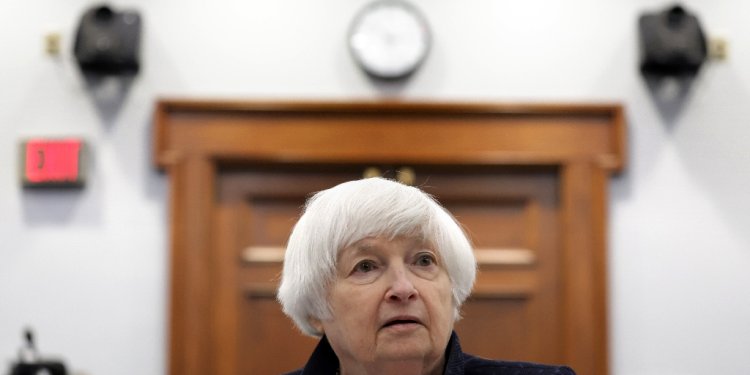US Treasury Secretary Janet Yellen leaves Wednesday for China, for the second time in less than a year to manage ties as Washington maintains a tough stance on Beijing ahead of November’s election.
Yellen’s trip from April 3-9 will begin in the southern Guangzhou city where she will speak with representatives of US firms as well meet with Chinese Vice Premier He Lifeng and Guangdong province governor Wang Weizhong.
She will then head north to Beijing for talks with Premier Li Qiang, Finance Minister Lan Fo’an and central bank governor Pan Gongsheng, said the Treasury Department.
Yellen’s trip comes just eight months since she first visited China as US Treasury chief seeking to stabilize turbulent relations between the world’s two biggest economies.
That trip in July 2023 helped restart dialogue after a period of heightened tensions and culminated in the launching of bilateral working groups on economic and financial policy.
This time, Yellen intends to press counterparts on “unfair trade practices” and highlight the “global economic consequences of Chinese industrial overcapacity,” said the Treasury.
Taking action
Washington is especially concerned about any surge of cheap exports in areas like electric vehicles, lithium-ion batteries and solar energy hurting US industries.
A flood of Chinese goods has previously impacted US firms and workers, Treasury Under Secretary for international affairs Jay Shambaugh told AFP.
“It is not something we intend to just watch,” he said in an interview.
“We’d like to see shifts across a number of things, whether it’s macro policy, industrial support, setting production targets that kind of exceed what the global market can bear,” Shambaugh added.
Yellen warned in December that China is “too large to export its way to growth.”
Tremors in China’s property market or problems with local government debt can also threaten spillovers.
“With China and an economy of its size and its scale, it is not just a price-taker on world markets,” a Treasury official told AFP on condition of anonymity.
‘Firmer footing’
But the US-China economic relationship is “unquestionably now on firmer footing than it was two years ago,” the official added.
Treasury Deputy Under Secretary for international finance Brent Neiman said the two countries have successfully conducted an exercise to see “what would happen if there was a failure of a global systemically important bank in either of our jurisdictions.”
Both countries’ central banks have also compared approaches to climate risk modeling, Neiman told AFP.
“We know our counterparts, we know their system, they know ours and frankly, if something were to go wrong, we know who to call,” he said.
The “downward trajectory” in US-China relations has stabilized since last year, said Bill Bishop, who publishes the Sinocism newsletter.
“But there’s nothing that would indicate sort of a more sustainable or structural shift in that trajectory,” he added.
China is especially upset with US efforts to restrict its access to higher ends of the semiconductor supply chain.
‘Wait-and-see’
With US elections approaching, “neither side is looking to launch major negotiations or bilateral initiatives,” said Brookings fellow Patricia Kim. “Beijing, like many foreign capitals, is likely in wait-and-see mode,” she added.
But maintaining communication allows both countries to discuss issues like debt challenges in developing countries, which the Treasury also intends to address.
Yun Sun, senior fellow at the Stimson Center, said concessions to China are impossible in an election year.
Yet both sides are willing to present the optics of close consultation, bringing a message of stabilization, she added.
Yellen’s last Beijing visit was met with fanfare, with her appearance at a local restaurant generating social media buzz.
The state-owned China Daily wrote in a recent editorial that Yellen is known for her “often pragmatic and relatively positive tone” in managing US-China ties.
Contrasting Yellen with “anti-China hawks in Washington,” the report said she is well-suited for a “bridging role” as she has built trust with counterparts. – Beiyi SEOW
© 2024 AFP











